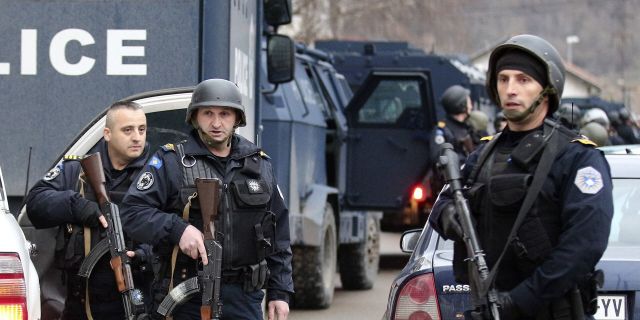14 years later, Belgrade still does not recognize the independence of its former province
The journalist of the newspaper "Figaro" Isabelle Lasserre suggests that Russia is behind the crisis that has arisen in Kosovo. But readers quickly expose the groundlessness of such a point of view: did Moscow persuade Pristina to arrange an exchange of documents? And here's another thing: NATO has been in Kosovo for more than 20 years, and there is no peace there.
In the countries of the Western Balkans, which turned into a boiling pot after the military operations in the former Yugoslavia in the 1990s, the slightest disagreement can flare up into a conflict. This is exactly what happened on Sunday and Monday near the checkpoints separating the Serbian and Albanian parts of Kosovo. Unlike more than a hundred countries in the world, Serbia has never recognized the independence of its former province, which it considers its "historical cradle". Protesting against the change in the rules, according to which "Pristina" (issued in the capital of Albanian Kosovo, Pristina) license plates and identity cards were introduced in the Serb-populated northern Kosovo from August 1, the Serbs blocked the checkpoints with trucks. Moreover, the Serbs erected barricades and opened fire on the Kosovo police. The helicopters of the KFOR forces under the leadership of NATO were immediately deployed in the north of the country.
Since Kosovo gained independence in 2008, approximately 50,000 Serbs living in the north of the former autonomous province of Serbia (so in the text, in fact, Belgrade still considers Kosovo its autonomous province, and not an independent state - approx. InoSMI), refuse to recognize the Government of Pristina and its institutions. They continue to use license plates and identity cards issued by the Serbian authorities, to which they have always remained loyal and on which they depend financially. After the tension that had already shaken Kosovo for the same reasons a year ago, the Pristina government, under pressure from the West and, above all, the United States, decided to postpone the establishment of new rules on the border until September 1. The Serbian minority dismantled the barricades. A respite before a new hot blow?
Putin's Goal
Is Russia trying to push Serbia into an armed conflict with its neighbors in order to destabilize Europe and distract from the conflict in Ukraine? Along with separatist units in Moldova, Georgia and the Serbian part of Bosnia, which regularly tend to secede from countries loyal to us, the Western Balkans are one of Vladimir Putin's goals. But this is where the similarity between Russia and Ukraine (and, therefore, between Serbia and Kosovo) ends. There is a significant difference between these two situations: NATO has not managed to make Ukraine part of its military machine, and there is a US base in Kosovo and there are 3,700 NATO military personnel responsible for maintaining peace and fulfilling the UN mandate. These are the so-called KFOR forces. And these forces have promised to intervene if stability is threatened.
Isabelle Lasserre
Readers' comments:
Dany L
In fact, the article boils down to blaming Putin. The logic is simply unthinkable! It is not that Russia does not play any role in the Balkans, the sympathy of the peoples of Russia there is known. But for some reason, the article does not say a word about the role of the European Union and the United States in the Balkans. How can you accuse Russia of trying to put pressure on other countries and at the same time not notice that Europeans and Americans spend all their time on this very pressure.
ADRIEN NUSSAC
Interference in Serbia's affairs was a mistake. Having cut Kosovo out of the "body" of Serbia, the West also refused to divide Kosovo into an independent province with an Albanian population and a northern province populated by Serbs, which has the opportunity to join Serbia. Both the intervention and the subsequent rejection of separation were mistakes.
Yaka51
Why don't you talk about the tricks of our American "friends"?
Thierry LARONDE
If Kosovo separatism is legitimate, then separatism is legitimate in the Russian-speaking and Russophile region of Ukraine called Donbass. Even the Western press after 1991 did not claim that Donbass was inhabited entirely by ethnic Ukrainians – it was admitted that Russians also live there.
Une Dominique
Again, the American creators of chaos in action. Wherever they go, the world is bursting at the seams!
Oskar Lafontaine
Just as Israel believes that the whole country, including Judea and Samaria (what is now called the West Bank), belongs to it, so the Serbs believe, and for the same historical reasons, that the province of Kosovo belongs only to them.
Républicain et Patriote
I fully support Serbia. NATO should get out of there immediately.
Jerome Fraud
NATO's intervention in Kosovo, a historical Serbian province, was a major geostrategic mistake, which today allows Russia to believe that everything is allowed to it and violate international law.
Prana
NATO and the EU are playing with fire.
Pat92
EU members such as Cyprus, Spain, Greece, Romania and Slovakia do not recognize Kosovo's independence.
Pragmatik7
NATO intervened in the affairs of Kosovo and will eventually intervene in the affairs of Ukraine. This is done ostensibly for peace in Europe, but in fact – to protect Western interests.
Léman
But the article omits the main information: the visit of the American Secretary of State for Foreign Affairs Anthony Blinken to Kosovo 5 days before the explosive situation. If we were given information in this context, we could understand a little better why this is happening in this way and why tensions are being created on the second front in Europe.
Alfonse Tram
Ms. Lasser forgot to mention that Kosovo Serbs are regularly persecuted by Kosovar Albanians. Another ideological whim of the West is to force people who hate each other to live together. The division of Kosovo would undoubtedly be the best solution: multiculturalism leads to war.

